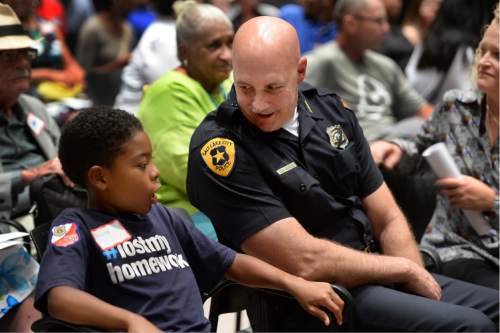This is an archived article that was published on sltrib.com in 2016, and information in the article may be outdated. It is provided only for personal research purposes and may not be reprinted.
You may be a state trooper, you might be a young Turk
You may be the head of some big TV network
You may be rich or poor, you may be blind or lame
You may be living in another country under another name
But you're gonna have to serve somebody, yes indeed
You're gonna have to serve somebody
It may seem strange that a nation is livid when a police officer shoots someone they shouldn't have shot and, a day or two later, is moved to tears when someone shoots a police officer.
It isn't strange. It's smart.
In both cases, the revulsion is not only against violence. It is against bigotry, against profiling. It is against an individual of any race or profession thinking they can end the life of a fellow human being because that person had some superficial characteristic in common with someone else who is seen to have done something bad.
More important, the rapid change of emotion is a recognition, perhaps unconscious, that the police work for us.
So when the police do wrong, they do it in our name, on our dime, acting in pursuit of our laws. They harm us all by undermining public trust not only in police officers, but the whole system of criminal justice, the entire civilization.
When, on the other hand, police officers are the victims of violence, whoever opened fire on them was attacking all of us.
Those officers were out there protecting us, because we asked them to. We hired them, swore them in, dressed them in uniforms, paid them shamefully small salaries and expected them to see things we don't want to see, go places we are afraid to go and deal with people who frighten us.
We thus have a right to at least hope that police officers will make better judgments than individual civilians who may or may not be a threat or just are at the wrong place at the wrong time.
It is wrong to wave away a case of an officer who shot an innocent person for no apparent reason other than he was black. It is wrong to contend that it must somehow have been the victim's fault for committing some petty crime or not obeying an officer's order.
It is wrong for the simple reason that the police officer worked for us and the civilian didn't. Civilian victims of police shootings aren't sworn, aren't trained, aren't on the payroll.
Yes, the civilians should obey the law. But the officers are the law, and we must demand that they act like it. Even though it is, and always will be, a really hard job.
Here in Salt Lake City, Police Chief Mike Brown and Sheriff Jim Winder are fully aware of the need for community outreach, for training officers better, for stressing de-escalation of tense situations rather than resolving them with gunfire. Getting that down to street level will be rough, but it must be a priority.
It is like the lesson many of us learned after, too long after, the war in Vietnam.
For a while, those who were rightly against that crime against humanity blamed the soldiers. Returning veterans were shunned, cursed at, spat upon, blamed for decisions they did not make.
Yes, the soldiers worked for us. But, legally, they were doing our bidding. If we didn't like what they were doing — killing civilians, burning villages, napalming farms — it was our job to tell the other, more powerful people who worked for us — elected officials mostly — that we wanted it stopped.
Any attempt to blame enemies for our faults just isn't honest. Lyndon Johnson and Richard Nixon worked for us. The Viet Cong didn't. George W. Bush worked for us. Saddam Hussein didn't. (Except, maybe, back when he was fighting a war against Iran and we sold him the components for nerve gas.) The CIA worked for us. The hapless Afghans tortured at Abu Ghraib and Guantanamo Bay didn't.
If we want to brag that our guys are the good guys, it has to be because they are good, not just because they are ours.
George Pyle, a Tribune editorial writer, has been coasting on white privilege for almost 60 years.



